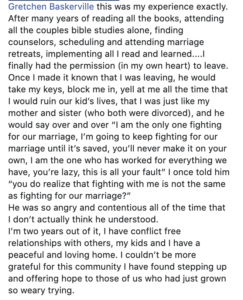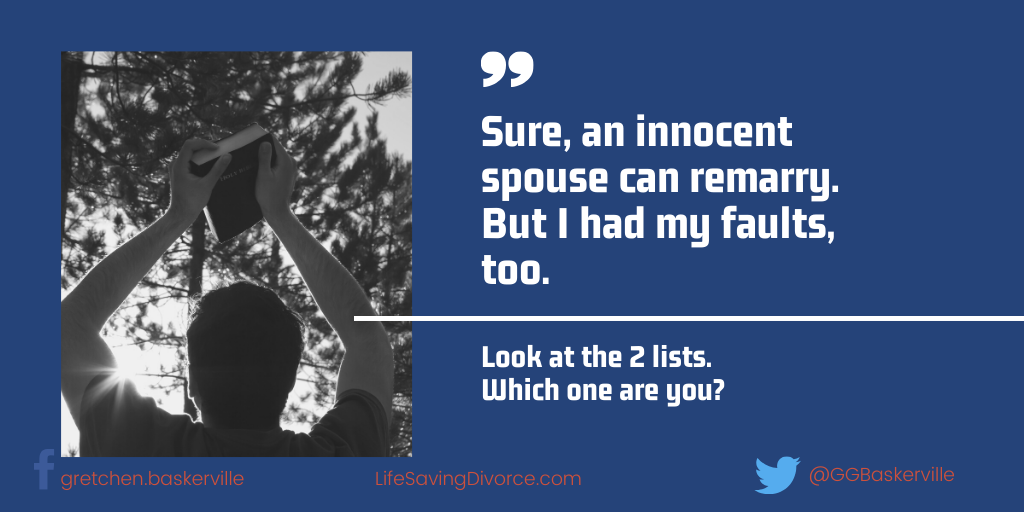How Can I Claim to be the Innocent Spouse? I Had My Faults Too!
Recently in my private Facebook group, we were talking about the Bible allowing remarriage for the innocent spouse after a valid divorce.
After all, God doesn’t hold you responsible for your spouse’s cheating, or abuse, or neglect, or drug/alcohol problems, or sexual addictions. No one forced them to behave this way. And surely, they had other options, such as counseling or learning communication skills if they thought you were the problem.

(What is valid? The Bible says valid reasons include adultery, sexual immorality, physical abuse, emotional abuse, or abandonment/neglect for example due to severe drug or alcohol abuse.)
But several people said, “Wait! How can I claim to be the innocent spouse? I’m sure not perfect! After all, I yelled, slammed doors, called names and swore too!
(See the two checklists below to figure out if you're the spouse who was invested in the marriage—or if your spouse was.)
The women said something like this:
I know I wasn’t the one who committed adultery. I wasn’t the abuser. But I have a hard time calling myself innocent. I got angry. I lashed out at times. I said a lot of mean things.
And the men would say:
I wasn't perfect by any means and not completely innocent. But I was taught, “A good Christian husband must sacrifice his wants to make his wife happy.” I took it seriously. Still, I can’t help but feel I was the bad guy. I told myself: if only I could have been better, I could have made it work.
Good spouses are really hard on themselves.
They are invested in the relationship, as therapist Bob Hamp says. They want their marriage to be a good marriage, and so they bend over backward to make it work.
They wondered if they could be doing more to make the marriage better.
THE INVESTED SPOUSE IS THE ONE WHO—
And with this much investment, we can all understand why good spouses would get angry at the one who doesn’t invest in the love, kindness, or safety of the relationship.
THE DESTRUCTIVE SPOUSE IS THE ONE WHO—
-
—Excuses or minimizes their own bad behavior, or tells you you’re too demanding.—Blames their behavior or attitude on something you did or didn’t do.—Guilts you for being angry, saying it’s not Christ-like.—Doesn’t sit up at night worrying about their own sinful behavior.—Doesn't volunteer to take responsibility for making the marriage loving.—Defines "saving the marriage" as blocking you from leaving, rather than actually changing their behavior.—Tells you to forgive because that’s what true Christians must do.—Doesn’t turn themselves inside out looking for ways to improve as a spouse.—May quote Bible verses at you, but insist that you make all the changes.—Doesn’t admit sin or misdeeds unless you make a big deal and threaten to leave.—Claims you misunderstood, implies you have no right to complain because you’re not perfect either. See pp. 132-142 of The Life-Saving Divorce.)
Story: One woman told about her husband who claimed to be more committed to the marriage than she was.
(I'm grateful to this woman for giving me permission to put her story in this blog post. And as always, I want to make it clear that sometimes it's the husband who is genuinely invested in making the marriage safe and loving, and not the wife. Sometimes she is the self-centered one who abuses or betrays her husband. I have several stories in Chap. 9 and elsewhere in my book about men as victims of abuse or adultery.)

Let's look at her story.
She wants a safe and loving marriage and we have evidence. She's spent time, effort, and money buying marriage books, finding therapists her husband will see, and arranging for them to go on marriage retreats. She's changed her behavior to match the advice of Christian marriage book authors. She's committed. I sense she loved her husband or at least wanted to have a good marriage with him. But after she'd tried everything, she realized these steps have been a one-way street. The marriage isn't better. It's actually worse.
When she finally gave up and let him know, he had a choice:
To invest and make the marriage better, or to block her from leaving.
He chose the latter.
He merely wants to be married, he doesn't care to make the marriage loving. How do we know?
He has defined "saving the marriage" as blocking her from leaving, using:
- coercion (taking her keys),
- physical restraint/bullying (blocking her car)
- false accusations ("you're lazy")
- fear-bombing ("you'll ruin our kids' lives")
- intimidation (he's angry and contentious)
- demeaning ("you'll never make it on your own")
- devaluing (implying that she has made no contribution to the family's success).
Rather than actually changing his attitude and investing to make the marriage safe and respectful, he manipulates. Notice the end of her story: She and the kids have a peaceful and loving home now.
How can he claim to believe in the sanctity of marriage? Where is his love and his sacrifice? Does he have a pang of conscience and go to therapy to work on himself? Or does he just get defensive and manipulate his wife?
In cases like this, the invested spouse has proven their commitment. Every day they entered that tense home, and faced a person who wasn't making the marriage loving, they proved they believed in the sanctity of marriage. Every decision they made to give up their own wishes, desires, preferences, and voice, is another evidence that they were willing to sacrifice their wellbeing to keep the marriage.
How many more days do you need to prove
to yourself that you tried hard enough?
If this describes you, if you need a life-saving divorce to save your life and sanity, and to escape a marriage with adultery, sexual immorality, physical abuse, mental abuse, substance abuse, or abandonment/neglect, you are free to go. And God will still love you. Really.
Footnote:
1 I'm indebted to Patrick Doyle for introducing me to the idea that we show our investment in the marriage by all the ways we spend time, money, and effort into saving it.
Popular posts:
One Woman's Story: Adultery, Prayer, and the Bible
The Bible Doesn't Say "God hates Divorce"—it's not in the Hebrew text
Bible verses that condone divorce for serious reasons, including mental abuse.
The 27 myths of divorce that aren't likely true for godly Christians.
"He Never Hit Me": Interview with a woman whose husband emotionally abused and neglected her
10 Turning Points: What is the "Last Straw" for Most Devout Christians. See One, Two, Three.
Children and Divorce: Why life-saving divorce is very good for children
How do I start dating again? I worry I'll never find anyone.
Examples of 150 examples of types of abuse (physical, emotional, sexual, financial, and neglect) and explaining the term "gaslighting," along with many first-person stories, read Chapter 4 in the Life-Saving Divorce.
For a diagram of the Duluth Wheel of Power and Control and The Abuse Cycle, read Chapter 4.

For more on the myths of divorce, buy the Life-Saving Divorce.
As an Amazon Associate I earn from qualifying purchases.

